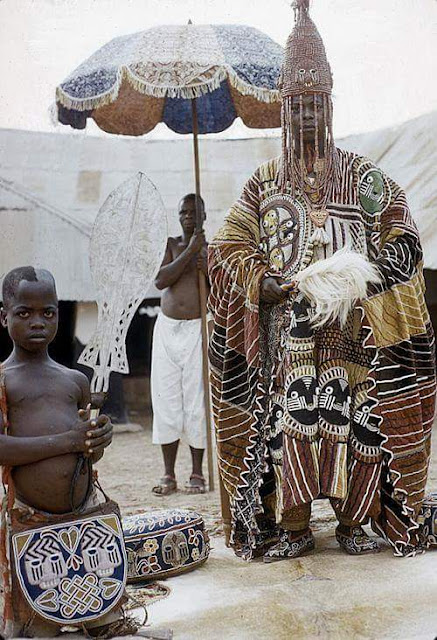Kabiyesi Olofinlade Afunbiowo Adesida 1, the 41st Deji of Akure kingdom who reigned for 60 eventful years from 1897 to 1957.
He was 125 years old when he changed mortality for immortality.
Alayeluwa Afunbiowo Adesida 1:
Oba Adesida 1, who reigned for six decades, from 1897 to 1957, was from the only ruling house, the Asodeboyede Ruling House. He was the 41st Deji. He was held in awe by the British colonial masters, who met him on the throne. In 1956, when Queen Elizabeth of England visited Nigeria, he was given recognition by the government. He could be described as the founder of modern Akureland. When Akure was still part of the Ekiti Pelupelu,Adesida was a reservoir of knowledge and experience. Whenever other Obas could not resolve a puzzle, he was the last resort. He was already advanced in years in the thirties and forties. The old Deji was always calm. The colonial District Officers and representatives of the Resident, who were usually present at the pelupelu meetings always listened to him and followed his advice in the resolution of problems. His rich experience and sense of history were invaluable. For example, when the British wanted to lump Mobaland with the Northern Province, he and the Ewi Aladesanmi cried foul, explaining that the move would further balkanise the Ekiti Confederation. Being an old man, the colonial officers listened to his pleas. His advice that Otun, the territory of the Oore, a descendant of Oduduwa, should remain in Ekiti, was followed by the officers.
Oba Adesida’s disposition to strangers made Akure to enlarge its coast. He was very accommodating. When communal conflict rattled Owo, many people came from the town to seek refuge under the monarch. He gave them land to settle and did not demand for the customary Isakole (royalty) from the strangers. He believed that Yoruba was one. Oba Adesida 1 was also a great traditionalist who maintained intimacy with the Benin Kingdom. The late President of the Western Regional House of Chiefs, Oba Ereduwa, was always fond of him. Adesida was not lettered, but, he had a cosmopolitan disposition. Even, when Akure and Idanre were locked in a protracted land suit, he did not ignore the option of peaceful resolution along the path of custom and tradition.
Deji Adesida was greatly missed in Ekiti Confederation when he pulled out of the arrangement. He opted out because he could no more endure the embarrassment and recalcitrant attitude of Alaaye Adeniran of Efon Kingdom, who did not accord respect to his age and status during discussions. Oba Adeniran was said to be a pompous and arrogant monarch. A war of words broke out between the aged Deji and the youthful Alaaye, apparently over traditional seniority as descendants of Oduduwa. The former took exception to the arrogance of the later. He cautioned Alaaye against arrogance of power, saying: “The world of honey, which we elders try to lick with our finger is what you have approached with a big wooden spoon.” In years to come, Alaaye’s youthful exuberance led to his waterloo.
When Deji Adesida returned to Akure, he reported the incident between him and the Alaaye to the Resident and persuaded him to carve Akure and environs out of Ekitiland. The Resident obliged him and the chord was severed. Akure ceased to be an Ekiti town. That was how it later became the headquarters of the defunct Ondo Province and later, Ondo State.
When the great monarch was approaching his grave, it was said that he assembled his children to pray for them. Many of them were literate. He gave them his parting words, which underscored his sensitivity and lack of selfishness. Community historians recalled that the Obarequested that his children should not succeed him. He noted that, as the representative of the esteemed royal house, the gods and ancestors had been kind to him by honouring him with long life and prosperity. He said Olodumare had answered his prayers to rule the kingdom, in spite of two futile attempts in the past. Oba Adesida 1 reigned for a long time spanning primitive and modern times. He was a father figure who understood tradition, custom and natural justice. During his reign, there was no tension between Akure and Isinkan, where the Aralepo, is the overlord. He and the Osolo of Isolo and other high chiefs also enjoyed intimacy. The great ruler was humble. But, he was also traditionally powerful. At 120 years, his then 19-year-old youngest wife had sued for a divorce, claiming that he could not satisfy her. When his evidence was being taken in the palace by court officials, he pleaded with them to appeal to her not to go because he loved her. The king did not intimidate the teenager. When a prominent lawyer who crossed examined him in court put him on the edge in the witness box, he protested the affront on his royal dignity. As the lawyer was coming out of the court, he fell down. The lawyer knew what was wrong. He sent emissaries to the Deji to beg him.
Akure mourned the demise of a great ruler who presided over a peaceful and glorious era, a decent royal father who could not hurt a fly. However, his children did not heed his advice not to struggle with another branch of the single royal house for the prestigious throne. As educated elite, they perceived it as a special inheritance. The town was also divided over succession. When the next branch of the expanded ruling house was making preparations to select a successor, the educated elite were rooting for one of Adesida’s sons, the highly charismatic Prince Ademuwagun Adesida, a fearless lawyer and an apple of his father’s eyes. He became Oba Adesida 11. Townspeople could not confirm whether the prince was around when his father advised his siblings not to vie for the crown.






























